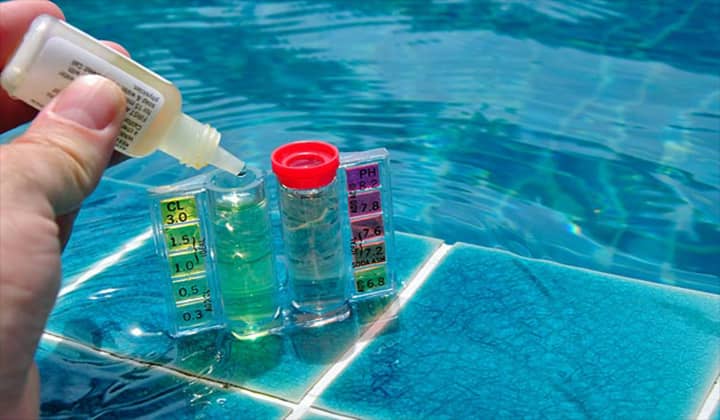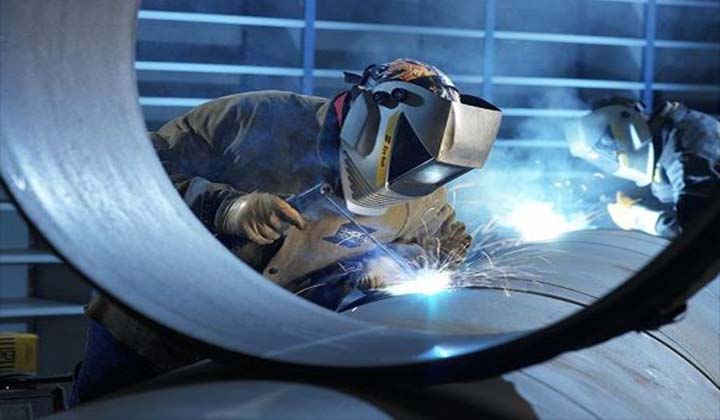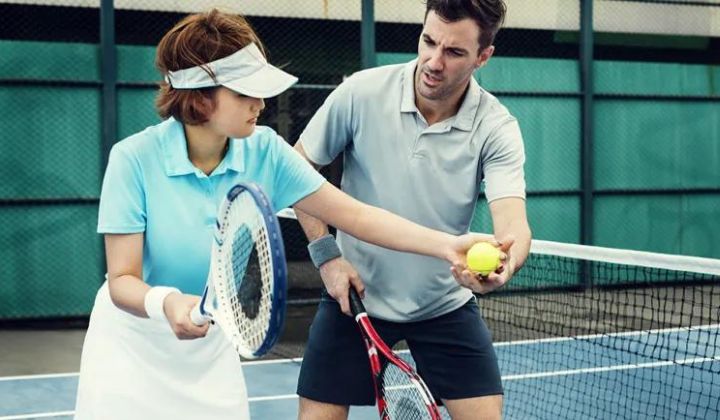The dangers of chlorine in swimming pools have been widely reported. Here we take a look at these dangers.
The importance of chlorine
Nội dung tóm tắt bài viết
First, here’s why many people use chlorine in pools:
- Chlorine helps kill bacteria very quickly and easily.
- It kills algae at high alcohol concentrations.
- Chlorine breaks down oils, lotions, and skin flakes, commonly known as “waste”.
>>> Chemicals in swimming pools and how to protect them safely

Dangers of chlorine in swimming pools
Below we take a look at 3 dangers of chlorine in the pool.
Skin Irritants
We all know what the chemical feel of the pool is when swimming. Blurred vision, chlorine smell, etc. According to analysis from experts, chlorine water causes skin irritation. It can even develop a skin rash like eczema.
This is because chlorinated water has the ability to destroy unsaturated fatty acids and vitamin E. It is naturally stored in the body, and at the same time, produces toxins that create free radicals. If you notice that your skin is becoming more and more irritated by chlorine after each swim. Consider looking into a healthy dietary supplement to supplement . Some doctors recommend supplementing it with certain essential fatty acids, like flaxseed oil and vitamin E. Plus, along with eczema, chlorine has also been shown to aggravate existing skin conditions like acne. fish, seborrheic psoriasis.
Compounds called Trihalomethanes
What are Triahalomethames and why should they be important to you? For starters, trihalomethanes are carcinogenic due to the combination of chlorine and organic compounds in water. These chemicals do not break down well and are usually stored in the body’s fatty tissues.
At first glance, that doesn’t seem so bad, but when you think about some of that “fat tissue” that covers the breasts and by the enlarged wings, correct mom. Starting why some people are increasingly interested.
Furthermore, these chemicals are also known as organochlorides, in addition to being stored in breast milk. Has been found in other body fluids. That is blood and semen. The results can be extremely harmful because organochlorides can cause mutations in DNA, suppress the body’s immune function and interfere with cell growth.
Other health concerns
Unfortunately, the list of dangers of chlorinated pools goes on. Chlorine, especially in frequently chlorinated children, has also been recognized as an aggravating factor for asthma. Several studies have also linked chlorine and chlorine byproducts:
- Bladder cancer
- Breast cancer
- Melanoma
- Impact on the gut
Additionally, scientists are exploring a link between chlorinated tap water and congenital heart abnormalities.
Main issues
Here are some important facts for you to consider, as it can help you decide if chlorine is the right choice for you and your family:
- Swimmers absorb toxic levels of chlorine during exercise.
- Children inhale more air per unit of body weight than adults. As a result, children absorb a larger amount of toxins, relatively speaking, than older swimmers.
- Amazingly, in chlorinated pools, tooth enamel can erode due to increased acidity levels.
- Although greater absorption of toxins occurs through the skin than in breathing air, the act of breathing alone is sufficient. At least in some swimmers, causes hypersensitivity and asthma.
Safety tips
While the reported risk of chlorine in swimming pools is scary, there are a few things you can do to keep you and everyone else safe.
- Don’t use too much chlorine in the pool: After this is easy to see, chlorine kills bacteria, so more chlorine can be kept safer. Chlorine is a pretty strong thing, so sticking to the recommended amount will help reduce the risk of harm to health.
- Limit time in the water: This can be difficult to do, especially if you’re training professionally for a competition or similar. But given the health risks, it’s something to consider. If you must spend a lot of time in a pool, then think about adding the previously mentioned essential fatty acids to your diet.
- Buy an Alternative: There are alternatives to chlorine for pool cleaning. It may be worth the time to check them out by visiting your local pool store or doing a little research online.
Dangers of pool chlorine
Anyone who owns or swims in a swimming pool should be aware of the dangers of pool chlorine.
Potential dangers of pool chlorine
Chlorine is used to keep swimming pools free of bacteria and other harmful substances so that the water is safe for swimming. However, pool chlorine is not without its risks. As with all household chemicals, proper procedures must be followed when storing and using chlorine to avoid a number of safety issues.
Use as directed
The first safety rule for chlorine and all household chemicals is to follow the manufacturer’s instructions for safe use and storage. The fact that chlorine is a common chemical does not mean that it is not dangerous when used improperly. Actually chlorine is toxic, flammable and corrosive. When properly stored and used, it can serve the function of keeping the water in your pool clean. Used improperly, chlorine poses a serious risk of illness, injury, fire, and explosion.
Tips for using specific chlorine
When using chlorine, you should limit:
- Breathing chlorine smoke
- Consume or eat chlorine
- Touch the substance with your bare hands
- Mix chlorine with any other chemical
- Mix different forms of chlorine together
Tips for storing chlorine
- Make sure chlorine is kept out of reach of children
- Make sure pets that cannot be exposed to chlorine are stored
- Keep chlorine away from any other flammable substances
- Do not remove chlorine from its original container for storage
- Keep your poison control phone number handy
- Strictly follow fire prevention instructions
- Note that these tips apply to all household chemicals
- Follow manufacturer’s recommendations for safet storage without fail
Maintain proper water pH level
The main reason for using chlorine in swimming pools is to keep the water free of bacteria and other organisms keeping the water free of bacteria and other organisms that can pose a risk to human health. However, simply putting chlorine in a swimming pool is not enough to ensure that the water is safe for swimming. If you have a chlorinated swimming pool, you must make sure that the pH level is not maintained properly, harmful bacteria can exist even in the water that has been chlorinated.
Dangers of swimming pool chlorine exposure
Some of the risks of chlorine exposure in swimming pools include:
- Let toxins be absorbed through the skin
- May cause skin irritation and trigger rashes, including eczema
- May cause burns and eye irritation
- May trigger or worsen many bronchial problems, including asthma
- Possible association between chlorine exposure and certain types of cancer
- Has a bleaching effect on clothes and hair
Alternatives to chlorinated pools
There are natural, chemical-free alternatives to pool chlorine. If you are not comfortable storing chlorine on your property or you want to avoid treating your pool that chemical. You may want to consider one of the alternatives listed below.
Does not contain chlorine
Chlorine free ionizing capsules can provide chemical-free pool treatments. This product helps to remove bacteria, algae, and other organisms that are dangerous to humans from pool water. The product is very easy to use. Simply drop a blue Genie capsule into the pool skimmer. And ionization takes care of the rest. It takes about two weeks for the process to work initially. To keep the pool clean and safe for swimming, the capsule will have to be replaced once a year.
Pristine blue
Pristine: This product protects pool water from algae and bacteria without the use of chlorine. It does not bleach and is safer to store than chlorine. The water is safe to swim immediately after treatment and no daily water testing is required.
Chlorine or no chlorine?
Only you can decide if a chlorinated or non-chlorinated tank maintenance system is right for you. Using chemicals is not without risk. All-natural products do not have the same risks as their chemical counterparts. But there is debate about their effectiveness at keeping water free of harmful bacteria and other organic matter. No matter what type of pool maintenance system you choose. You need to carefully follow all instructions for safe use and storage. oh






